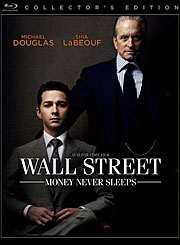Susan Sarandon, Frank Langella
Never Sleeps
- Rated PG-13
- Drama
- 2010
- Buy the BD
All photos © 20th Century Fox
Reviewed by Jason Newman
once said 'Greed is good,'" says an ostensibly reformed Gordon Gekko (Michael Douglas), fresh out of prison and now on the college lecture circuit to promote his new book. "Now it seems it's legal."
When Douglas gave his now-iconic speech to shareholders in Oliver Stone's 1987 classic "Wall Street,” the film, and that speech in particular, defined a cultural zeitgeist of avarice and power-grabbing endemic on the real Wall Street. Two decades later, as more and more Americans watch their 401(k)s swan dive and financial institutions dissolving based on stupidity and greed, Gekko's sentiment in "Wall Street: Money Never Sleeps" that he's "small time compared to these guys" may be the most accurate statement in the film.
It's 2007. Gekko has been out of jail for seven years and has written an autobiography about his time as a corporate raider in the 1980s. His daughter Winnie (Carey Mulligan) is, not surprisingly, the antithesis of her father, working for a MoveOn.org-esque left-wing website while dating – Freud alert – Wall Street wunderkind Jacob Moore (Shia LaBeouf). Moore is that rare Wall Street breed: the money-hungry idealist; capitalist to the core but leveraging his access to fund research for alternative energy sources.
Winnie and her dad never exactly had the best relationship, worsened when Mulligan's brother commits suicide after their father is sent to prison. They haven't spoken in years, and only meet through Jacob, who has been talking to Gekko behind Winnie's back about his firm's current financial troubles. When Jacob's firm goes under, he is forced to make a Faustian deal with rival firm chief Bretton James (Josh Brolin), the same guy who helped send Gekko to prison.
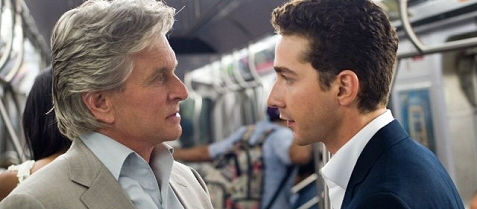
There are a lot of things to like about "Wall Street." Stone deftly shows how rumors – irrespective of any actual grains of truth – can quickly become fact in warped, self-fulfilling prophecies that have long been par for the course on Wall Street. Where Stone excels is in the backroom meetings between the firms and the Federal Reserve, with LaBeouf's company standing in for beleaguered and now-defunct Bear Stearns. Stone skillfully delves into the psychological underpinnings tied to the government's decision to let certain banks fail and others float, an aspect that went missing from most of the real financial chatter during the worst meltdown in generations (not to mention the personal back scratching, but that's another article).
But problems arise quickly and consistently. It's easy to be preachy in hindsight with a movie like this – which Stone thankfully avoids – but the filmmaker errs on the other side, loading his film with exposition and an unnecessarily convoluted plot involving Winnie's $100 million Swiss bank account trust fund. When Gekko is speaking to the college class, bemoaning how "no one is responsible [for the crisis] because everyone is drinking the same Kool-Aid," it's hard not to see Stone's face reflecting back at the audience.
Visually, the film is a mess. Perhaps in deference to the prevalent techniques used during the original film's time period, Stone peppers the movie with numerous montages, split screens, and, I can't believe I'm writing this, a bubble shot a la Pop Up Video that comes off more cheesy than nostalgic.
What he loses in visual flourish, though, Stone, along with screenwriters Allan Loeb and Stephen Schiff, compensates for by drawing out each character's contradictions and complexities far better than the original. For all its strengths, the original lacked any sort of character development for Gekko (Bud Fox [Charlie Sheen], the original film's protagonist, makes a hilarious cameo in the sequel). Here, Gekko drinks Johnny Walker Blue, yet rides the decidedly un-Wall Street New York subway. LaBeouf, engaged to a liberal blogger, is earnest in his desire to fund alternative energy sources, but uses a Bluetooth while riding a Ducati down New York City streets and buys bottles of Moet to celebrate his seven-figure bonus.
"Money Never Sleeps" never fails to entertain, yet there's an undercurrent of desperation inherent in the idea of even making this film. It's admirable to try and capture the current economic climate – done better in "American Casino" or any of the numerous "Frontline" specials devoted to the crisis – but where "Wall Street" became the archetype for arrogant, bad behavior, "Money Never Sleeps" feels like it's piggybacking off an easy topic to exploit. But then again, Stone would hardly be the first person to cash in on this crisis over the past three years.
Two-Disc Blu-Ray Review:
Diehard fans will find a lot to love about the film's Blu-ray release, with director Oliver Stone contributing an audio commentary, as well as serving as moderator for an intimate Q&A with his cast. Additionally, there are a handful of featurettes about various aspects of the film (including a retrospective on the original), deleted scenes, and a series of interviews with Michael Douglas, Shia LaBeouf, Carey Mulligan, Josh Brolin and Frank Langella discussing their characters for a Fox Movie Channel segment.
 |
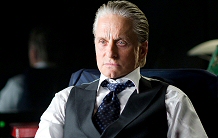 |
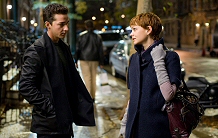 |
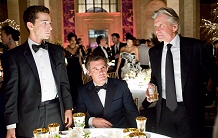 |
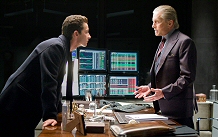 |
 |
You can follow us on Twitter and Facebook for content updates. Also, sign up for our email list for weekly updates and check us out on Google+ as well.












